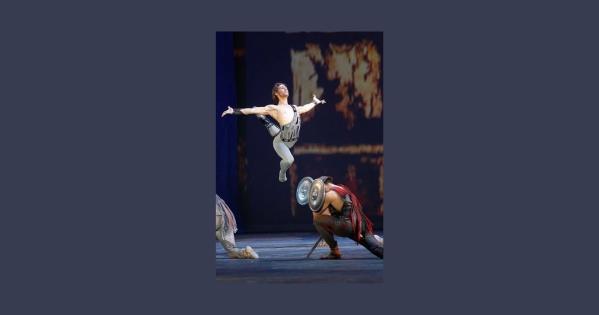Spartacus by Aram Khachaturian

Welcome to Feature Fridays! In this series, AU Music Library staff highlight items from our collection. This week, Music Library Student Assistant Julia Kane discusses Spartacus by Aram Khachaturian.
Aram Khachaturian was a Soviet-Armenian composer best known for his ballets. He composed the ballet Spartacus in 1954, based on the true story of a slave uprising against the Romans. The ballet was choreographed by Leonid Yakobson and premiered in 1956 at the Kirov Theatre in Leningrad. The orchestral composition consists of four suites; however, it was cut down to three acts for the ballet, and the order of some of the pieces was changed.
In the story, Spartacus, the king of Thrace, is taken captive and forced to fight as a gladiator, while his wife is taken as a concubine. Spartacus leads the other slaves in rebellion, but (spoiler alert!) he is later found, and the ballet ends with his death by impaling.
The ballet’s mood shifts to tell the story. In the first act, the tension gradually builds as Spartacus, his wife Phrygia, and the other Thracians are brought into Rome and sold at a slave market. Spartacus and his friend Harmodius are sold as gladiators, while Phrygia is bought by a courtesan named Aegina. The act ends with “Dance of the Gaditanae,” which portrays a dramatic fight between two groups of gladiators. It is chaotic and frenzied, with heavy percussion and brass, until Spartacus and his men emerge victorious.
Act 2 opens in stark contrast to Act 1, with the slow, smooth “Adagio of Spartacus and Phrygia.” In this scene, Spartacus and Phrygia share a bittersweet reunion, soundtracked by swelling strings and gentle flute melodies. However, the action soon picks up again as the gladiators revolt against the Roman general Crassus.
The drama continues through Act 3. Spartacus’s troops are victorious, but soon Spartacus is betrayed by Harmodius. Though Act 3 closes with his death, it is a noble, triumphant ending, as the gladiators haven’t given up their fight for freedom.
Excerpts from Spartacus, as well as some of Khachaturian’s other works, are available from the AU Music Library on CD. You can also listen to the full ballet online with Naxos Music Library, with your AU login.
(Image Credit: Kremlin.ru, CC BY 4.0, https://commons.wikimedia.org/w/index.php?curid=19154211)